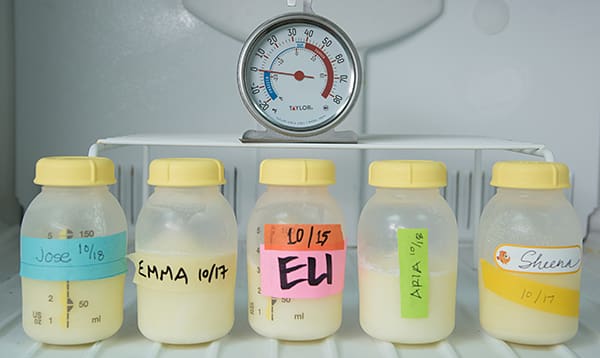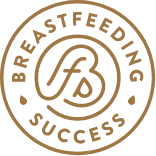By Ali Weatherford
So much of the information out there related to breastfeeding and breast milk is about how to make more. That makes sense, because the majority of breastfeeding people will wonder at some point, “Am I making enough milk?”
But, that is not an issue for some people. There are some situations where a person might actually have the opposite problem, and have more breast milk than they need.
When Does Extra Breast Milk Happen?
- You might do everything just right and still just have way too much milk. If your breasts produce more than you need and your baby isn’t able to remove ALL the milk each time, you might decide to pump to reduce your discomfort and swelling. Then you’ve got extra milk!
- You might not be over producing milk, but maybe you are just collecting a lot of milk. Here’s how that might happen. Some people decide to use a milk collection device like the Milkies Milk Saver to catch the milk that leaks from the opposite breast while they’re feeding their baby. You might then save that milk for times when your baby needs to take a bottle. If you have a good supply and very leaky breasts, you might end up with more than you need.
- You might pump a lot of milk to have a supply ready for when you go back to work or go on a trip and it ends up being more than you needed. Remember that you don’t need a huge stockpile of milk because you’ll also be pumping while you’re separated from your baby.
- You might pump often at work so you have milk to feed your baby while you’re gone. You might also do this to keep up your milk supply. Some people find that they just don’t need all the milk they are pumping out, because they’re able to feed the baby often while they’re with them. In that case, you have extra milk.
- If your baby is in the NICU, you might decide to pump regularly to have milk for your baby and to maintain your milk supply to be ready when your baby goes home. Your baby may be too small or just not ready to consume large amounts of milk in the hospital, but you have to continue pumping, and you end up with a lot of extra milk.
- And unfortunately there is sometimes the devastating experience of infant loss. When a parent experiences a stillbirth, or a loss due to birth complications or a premature or sick baby, the body still produces milk. There is a choice to be made at this point. A parent can choose to take steps to stop producing milk. That can sometimes be uncomfortable and can take some time, but it might be what feels most right. This is the right option for many families. Another option that some people choose is to collect and store breast milk for some amount of time. There might be a number of reasons a person might choose this option.
- You might know someone who needs breast milk and you want to be able to provide it.
- You might want to allow your milk supply to reduce more gradually, which can reduce the unpleasant symptoms for you and help with your postpartum healing.
- You might like the idea of providing donor milk for families with babies in the NICU.
Milk Donation
For people who have experienced a loss, donating breast milk can be a helpful healing experience. It can feel very empowering to make breast milk. The fact that your body can produce milk is truly incredible, and this renewed sense of confidence in your body can help with the healing process.
Whatever the reason for milk donation, the product that is donated is a critical life-saving gift. Human donor milk is used almost exclusively in NICUs now when a parent can’t provide the milk. Science and research have proven over and over that breast milk is the best thing to feed a sick baby. It can often mean the difference between life and death.
Because of this fact, milk banks have opened up all over the world. Their goal is to collect breast milk to supply NICUs first. When milk banks are doing well, they can provide enough so hospitals can also have a supply to offer families of healthy babies who just aren’t able to provide their own milk. And if there is even more, milk banks can sometimes offer the milk to the general public at a cost.
Milk banks screen potential donors to make sure that they are in good health before accepting milk donations, and the milk is also pasteurized for safety. So, if you have more milk than you need, consider donating the milk to a local milk bank. My hometown of Austin, TX, is home to one of the largest milk banks in the world, and we also have the Mothers’ Milk Bank of North Texas just a few hours up the road (no big deal in the giant state of Texas!), but some milk banks accept donations from all over the country using a very efficient shipping system, so even if you don’t have a milk bank near you, you still may be able to help.

